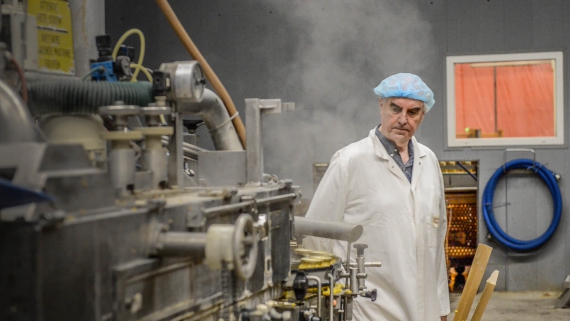What is important to Machandel? Founder Piet Glasbeek feels strongly: “With food, it’s all about transparency and accountability. Openness on the origin and production process of our products. Fair prices for the farmers we work with. And accountability to consumers and the people who work for you.”
In 1978, Piet harvested the field of headed cabbage he grew for fun next to his farm in the Frisian town of Haulerwijk. It proved to be an incredibly healthy crop, grown without pesticides or unnatural fertiliser. It’s quite a large pile of cabbage. But what to do with it? Piet decides to process the biodynamic harvest in the shed behind the house to make sauerkraut. Packaged by hand, the sauerkraut ripens in wooden containers with juniper berries to taste, following his grandmother’s recipe. In Old Frisian, a juniper berry is called a ‘Machandel’, which is what he calls the new business. “And, also important: I was also able to sell the containers of sauerkraut.”
Growing food was something Piet learned from his own family. But his interest runs deeper. During his studies at the social academy, he ran a little organic food store in Amsterdam in the sixties, out of dissatisfaction and as a protest against the far-reaching alienation in the food industry. In all its modesty, the organic shop was a statement in itself: “I believe you should know where your food comes from. We should move away from anonymous food. And it’s crazy to spray poison on something you’ll be eating a bit later.” Piet graduates and started his career in social work. But his ideas on pure organic food production remain, and slowly but surely he decides to put his ideals into practice. The 1978 sauerkraut harvest is the turning point.

Piet learns about the small world of organic and biodynamic farmers. One farmer grows pickled onions, others grow beans and legumes. He establishes long-term ties with the growers. “I sought out the farmers and together, we took to the fields. And we still work that way: we also work that way with our international suppliers of olives, chick peas and peanuts. Because you have to talk to each other: if I want this level of quality, what challenges does that present for you and how can we solve them? It takes years, but eventually we create the best product together. The harvest price is an important part of that, but not as important as our mutual trust. Farmers have to be able to make a living off their farmland in order to invest in their land. And for every little pea, we have to know where it came from and under which conditions it was grown.”
The Machandel containers were soon traded in for the more practical glass packaging and glass jars with products like corn and tomatoes which found their way to the emerging chains of health food stores. Piet: “Back then it was a turbulent industry, where it wasn’t always professional, but it matured over time. We also built sustainable relationships with our sales channels through frequent consultation. What do you need? Does this seem like a valuable addition to the product range?” Machandel’s product development department comes up with brand toppers like creamy mayonnaise and peanut butter. “By not surrendering to the supermarkets with their unpredictable purchasing behaviour, we managed to stay afloat and steadily grew along with the organic market.” However, today private labels take up a substantial portion of our production capacity. But that is based on agreements that are similar to those with the health food stores: spanning multiple years to guarantee the livelihood of all the links in the production chain.
“Machandel works with biodynamic ingredients, and any shortages are supplemented with organic ingredients. Our preference for biodynamic ingredients has to do with the dedication of the Demeter farmers. They achieve a higher level of quality due to the care they give to the soil and the environment. As the shepherds of the earth, we should cherish them.”